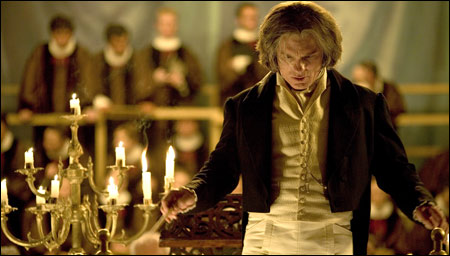Ed Harris didn’t exactly have to be talked into the title role in director Agnieszka Holland’s Copying Beethoven. One of the actor’s most noteworthy achievements was his playing of another difficult artist in his Oscar-nominated role in Pollock, a film which he also directed. What’s more, he has musical training (he played bass horn through high school), he’s known the director for 20 years, and so, “My initial thing was, God, you know, Beethoven, what a challenge!”

ACTING UP: Harris grew to admire the master |
Harris, 55, recently came to Boston to do interviews for the film while on break from playwright (and filmmaker) Neil LaBute’s one-man show in New York, Wrecks, and we talked in a closed dining room of the Four Seasons Hotel overlooking Boston Common. The film takes place in Beethoven’s final years as seen through the eyes of a young female music student who worked as his copyist. To prepare, Harris read extensively about Beethoven’s life and studied piano, violin, and conducting. Then there was the shoot, which took place in Hungary. “You’re getting the wardrobe together and you’re working with the wig people and working with the makeup people and suddenly you check yourself out in the mirror and it’s like, ‘Woah! . . . Okay, now can you act?’ ”
What was the key to his acting? “At this point in his life, this guy is not well, physically. He had digestive problems, respiratory problems, and if I’d been left to my own devices I very likely might have played him like someone who was ill. And one of the first things Agnieszka said to me was ‘This man has energy! He has energy until the day he dies. He’s filled with it; he’s vibrant.’ That was very important for me to hear as an actor, because my natural tendency is to be laid back.”
By the time Beethoven wrote his Ninth Symphony (a piece that, unlike the depiction in the film, was not conducted by the composer), he was completely deaf. And the young copyist, Anna (played by Diane Kruger), is a fabrication. “She gives him a person to talk to, to be intimate with, to share his feelings. And that was the express purpose of her character. I asked the writers point blank: why are you introducing this fictional character? It’s this otherwise accurate — at least musically very historically accurate — piece. And that was their answer: they wanted him to have a voice, someone to communicate with.” Thus, the theatrical conceit that the deaf Beethoven can at least read lips or hear with the aid of a hearing trumpet. To be completely faithful to a period in his life when Beethoven was communicating mostly through handwriting in “conversation books” would have been either impossible to film or “a five-hour movie.”
And, from the actor’s point of view, how does one troubled artist compare with another — Pollock and Beethoven? “Pollock’s work deteriorated in the last five years of his life, and Beethoven kept putting it out there, until he couldn’t breathe anymore. Beethoven wasn’t defeated — mentally, emotionally. He fought through his illness and kept working. And Pollock, his alcoholism got the better of him, and his psychological problems were debilitating. Beethoven was simply a much healthier individual. I mean, yes, he was a little reclusive; and, yes, he was a bit of an eccentric, but he had his wits about him and he did his work, and he did what he had to do to get his work done and he didn’t let anything get in the way.”